Search engine optimization (SEO) is constantly changing. You want to achieve good positions for your SEO in the organic search results? Then now is the best time to define your SEO strategy. How do you optimise your website for Google & Co. And which trends can you adapt to? An overview.
SEO Review
To better understand 2020's SEO trends, it is worth looking back at the changes in 2019. So you can see the trends and ambitions of the search engine giants. And my goodness! 2019 was a turbulent year for us search engine optimisers.
Tip: See the SEO Guide 2019 on our blog, with tips on Google RankBrain, Mobile First and Voice Search.
Changes to the search algorithm
Every year, Google makes adjustments to its search algorithm. The difference to the previous years: The number of SEO updates or changes continues to increase. At this point, big thanks to Peter J. Meyers, who researched the following numbers for Google:
- 2018: 3234 optimizations
- 2017: 2453 changes
- 2016: 1653 optimizations
- 2013: 890 optimizations
- … and so on
- 2009: 350-400 changes
This statement is most interesting for 2018:
"In 2018 alone, we made more than 3234 optimizations to Google Search. These range from innovations like the Knowledge Graph to updating our ranking algorithms. It's how we ensure we continue to deliver relevant and reliable content."
While the high number of changes speaks for rather small optimizations, this year there were also the much noticed big updates. Here is an overview before I come to the trends for 2020.
Confirmed Google algorithm updates for 2019
The Google Core March Update (March 12, 2019): also known as the Florida 2 update. It stands for comprehensive adjustments to the core algorithm. Such updates are usually about the quality of search results in general. There are - at least according to Google's statement - no specific recommendations to optimize your websites for the update.
The Google Core June Update (June 04, 2019) saw a similar update to the core algorithm. Google's SearchLiaison Twitter channel tells you when major changes go live:
Google Domain Diversity Update (07 June 2019): Here, the adjustment of search results was made when a domain with multiple URLs dominates a search query. This update is to prevent a website from ranking multiple times for the same search term. The Google update to reduce adult content (July 16, 2019) favors adult content. In other words: If there is a PG-free interpretation to a search query, Google will prefer it.
On September 18, 2019, an adjustment was made to how testimonials and reviews are displayed: Companies that have generated their Structured Data for reviews (so-called Google stars in the Serp's) themselves are no longer considered by the algorithm.
The Google BERT update of October 19, 2019, which affects 10 percent of all Google searches worldwide, is the subject of much discussion. BERT stands for "Bidirectional Encoder Representations from Transformers" and is intended to improve the text understanding of search queries in natural language (NLP). With this, the search giant wants to further increase the quality of its search results. A few more tips on this later.
Announcements, product updates & WordPress
Google introduces new link attributes
The announcement on September 10, 2019 had it all: Google declares to treat the Nofollow attribute differently in the future. The company gives you concrete solutions on how to deal with sponsored links and user-generated content.
The changes serve to differentiate the purpose and origin of a link more precisely - in order to better understand the relationship between your content and that of other websites. More information about this will follow later.
Search Console update
Already in 2018, Google announced that the Search Console (formerly: Webmaster Tools) will receive a completely new interface. On September 9, 2019, the time had finally come: The old Search Console was replaced by the new interface.
Gradually, it also received new updates and features. This also includes information that the old Search Console did not deliver. For example, the Search Console now informs about long loading times:
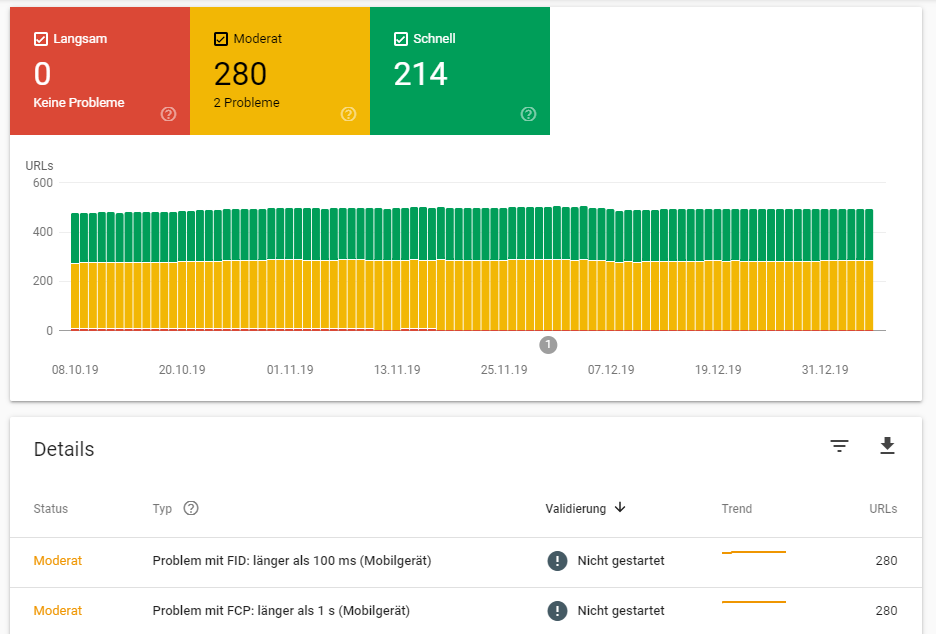
Tip: See our WordPress Hosting comparison. You can also learn how to optimize the speed of your website in our Performance E-Book.
There is also new information about the click rates of videos as well as numerous other updates. Basically, we are now getting a whole lot of insight into how Google understands our website from a technical perspective. Google would not undertake all these things if the technical optimizations could be neglected.
Updates for Pagespeed, Lighthouse, TestMySiteWithGoogle
Webmasters have known for years that the load time plays an important role for the user experience and SEO. The first Mobile First indexing has finally been available since 2018. And since the loading time can vary due to network availability or network speed, it makes sense to reduce it.
In addition to the Search Console, Google has updated and launched several products to help you optimise your website:
- PageSpeed Insights
- Test my Site with Google
- Lighthouse (also included in Chrome's developer tools)
Google's entry into the Plugin directory of WordPress
Google has published several Plugins for WordPress this year. So the open source CMS definitely carries weight for Google. For example, the Google Site Kit came on the market. It outputs important data to Analytics, Search Console and PageSpeed. On wordpress.org there is the matching WordPress Plugin .
Or the Native Lazyload Plugin. True, there are already some WordPress Plugins out there that support Lazy Load. But the extension again shows the ambitions of the search engine giant to further reduce the loading times for WordPress & Co.
More tools from Google for the SEO 2020
In addition to these tools, there were quite a few other announcements in 2019:
- A clarification on which rules in robots.txt are still supported in 2019 and which are not.
- The launch of Google Jobs in Germany in Mai 2019.
- The new FAQ & HowTo feature using Structured Data in the search results.
- As well as Google's investment to better crawl javascript and understand content. Announcements here range from the new Evergreen Crawling Bot to brand new educational courses, like the Webmaster Javascript SEO Series.
That wasn't even all of the announcements. Many details were only mentioned in the Webmaster Hangouts or on Twitter. So it's worth it for you to subscribe to those channels. One thing is for sure: SEOs had a lot to learn this year.
Tip: Dominik regularly writes SEOpostsfor us, in which he reports on the most important trends in Google. Follow us on Twitter, Facebook or via our newsletter to receive his posts.
From the announcements and algorithm updates of the last two years, you can derive the following recommendations for your SEO 2020:
The user experience has priority
In 2020, the most important imperative remains meeting the interests of your visitors. With each passing year, the line between user experience and search engine optimization is blurring. Sometimes it seems not unlikely that signals like dwell time will replace proven signals from SEO (for example backlinks).
But as a website operator you also benefit from many other positive effects of user experience, such as higher sales or faster loading times. But this also means that you have to concentrate on the essentials:
- Only invest in content that meets the search intent of your visitors. See Jan Tissler 's post on content strategy.
- Forget complicated funnels.
- Avoid uncommon hacks to get stars in the search results or to create content that is not interesting for your customers or users. This did not work in the past and will be even worse in the coming years. Precisely because search engines are becoming better and better at understanding content and its relationships.
- Avoid duplicate content or unnecessary intermediate pages. Guide your users to the destination as quickly as possible.
Build a brand or authority
Remember the Medi update from 2018? In August 2018, there was a big Google Core update that mostly affected the healthcare industry. Hence the name.
As it turned out later, this update wasn't aimed at the industry at all. Instead, the truth content and the authority of a content were reweighted. This content was classified according to the so-called Search Raters Quality Guidelines (PDF). A number of people rate the quality of a website according to corresponding guidelines. The collected data is then used to adjust the algorithm.
Of particular value are the 2 sections on YMYL (Your Money your Life) and EAT (expertise - authority - trust). This means publishing content on websites that can have negative impact on a person's life. For example because of false information about medicine & diseases, finances or law.
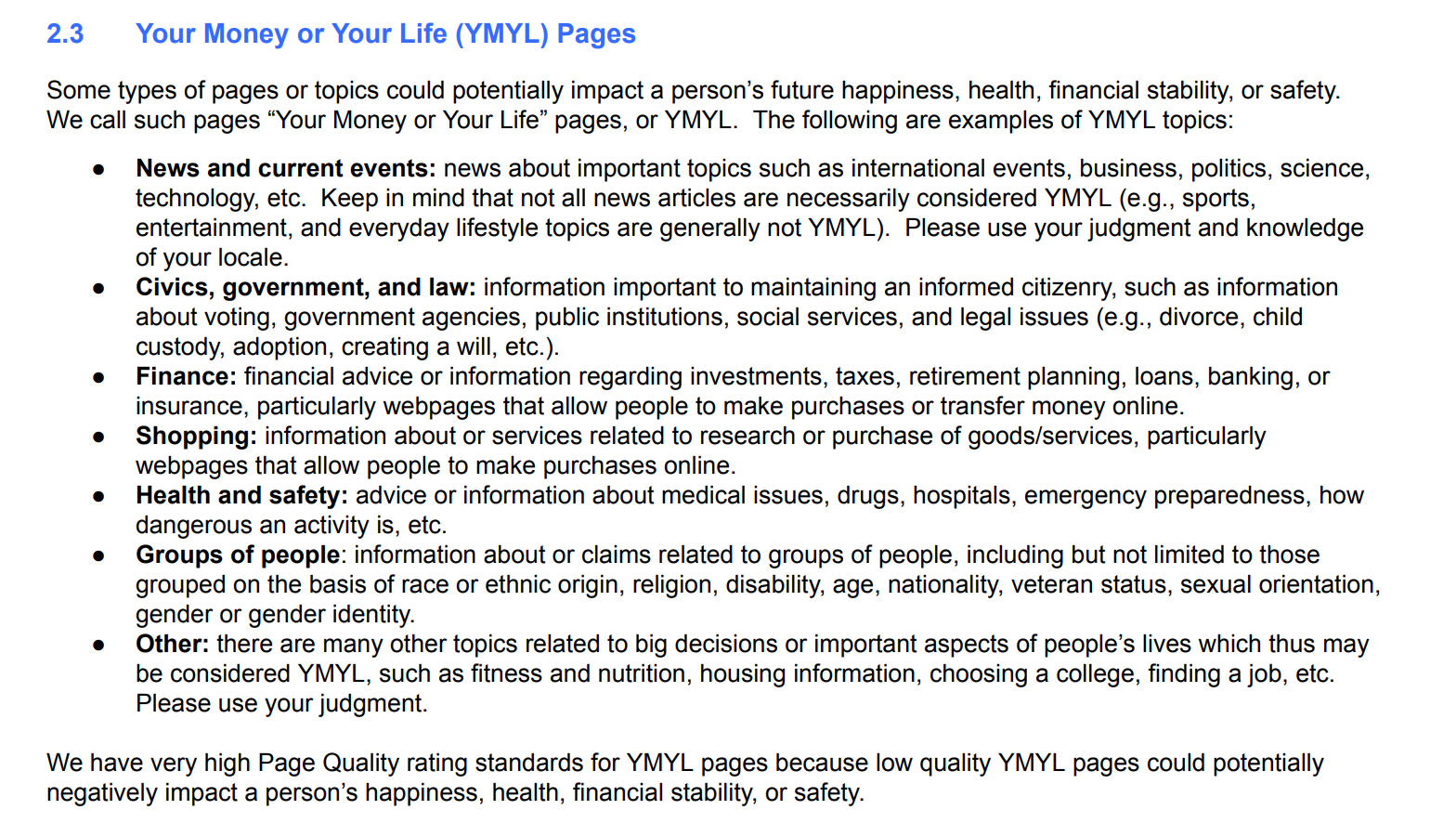
False information is against the interest of the user. They only give the site operator an advantage. But there are also other backgrounds. Companies are looking for ways to mitigate the damage caused by fake news. Among other things, this resulted from the Facebook Cambridge Analytica scandal. This makes it all the more important to build an authority or brand (Brand). That is, to create websites whose information content can be trusted. Google's CEO Eric Schmidt already confirmed this in 2008:
"Brands are the solution, not the problem. Brands are how you sort out the cesspool."
As a company that writes about sensitive topics, you can, for example, look for the following optimization possibilities:
- Work with source references in your content.
- Use microdata and author boxes to make it clear who wrote the content.
- Post information about what qualifies you to write about the topic.
- Build an authority on the topic in your niche. For example, through guest articles, link building on topic-relevant sites or on industry catalogs.
A client of mine's traffic also plummeted after the update in August 2018. However, following the tips in the Quality Rater Guidelines helped restore the original traffic:
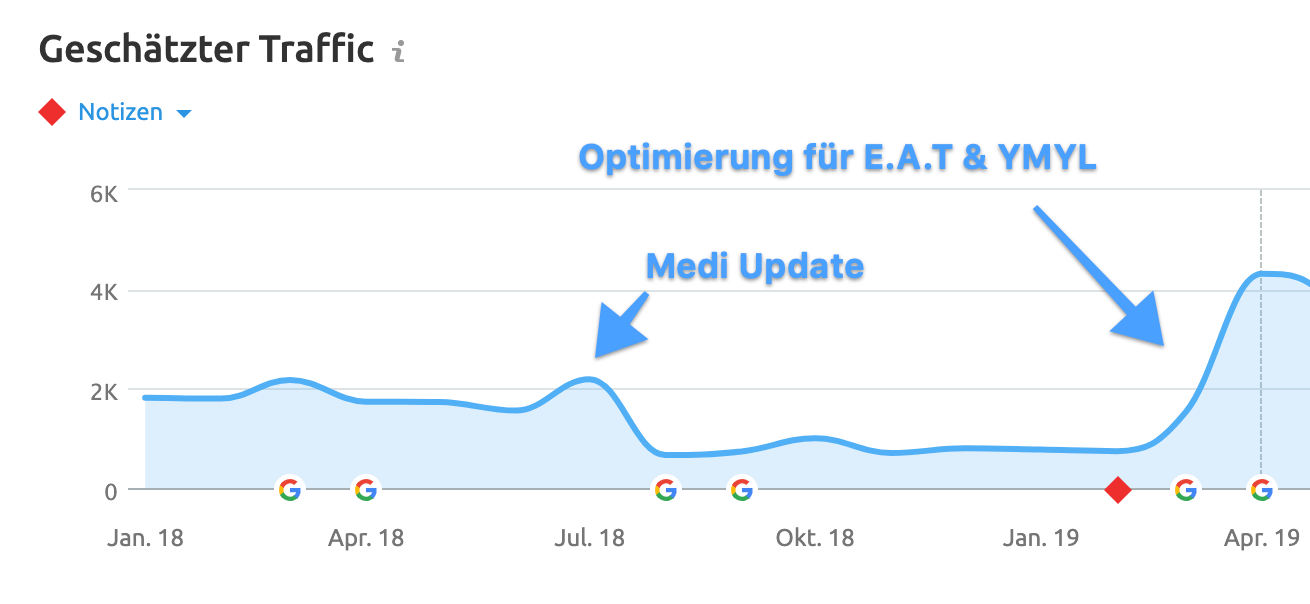
I recommend everyone involved with SEO 2020 to read the Raters Quality Guidelines thoroughly!
Technical optimization is more important than ever
Looking back at all the product updates over the last two years, we should be asking ourselves why Google is giving us all these tools at our fingertips. For no reason, certainly not.
Technical search engine optimization means, among other things: Make it clear to the search engines what content on your website is really relevant. Those methods that worked very well in 2019 remain valid in 2020. For example, internal linking and pillar content. Use offerings like Search Console to spot 404 errors on your website and fix them. This will prevent unnecessary redirects. Also test whether the structured data of your website is programmed correctly:
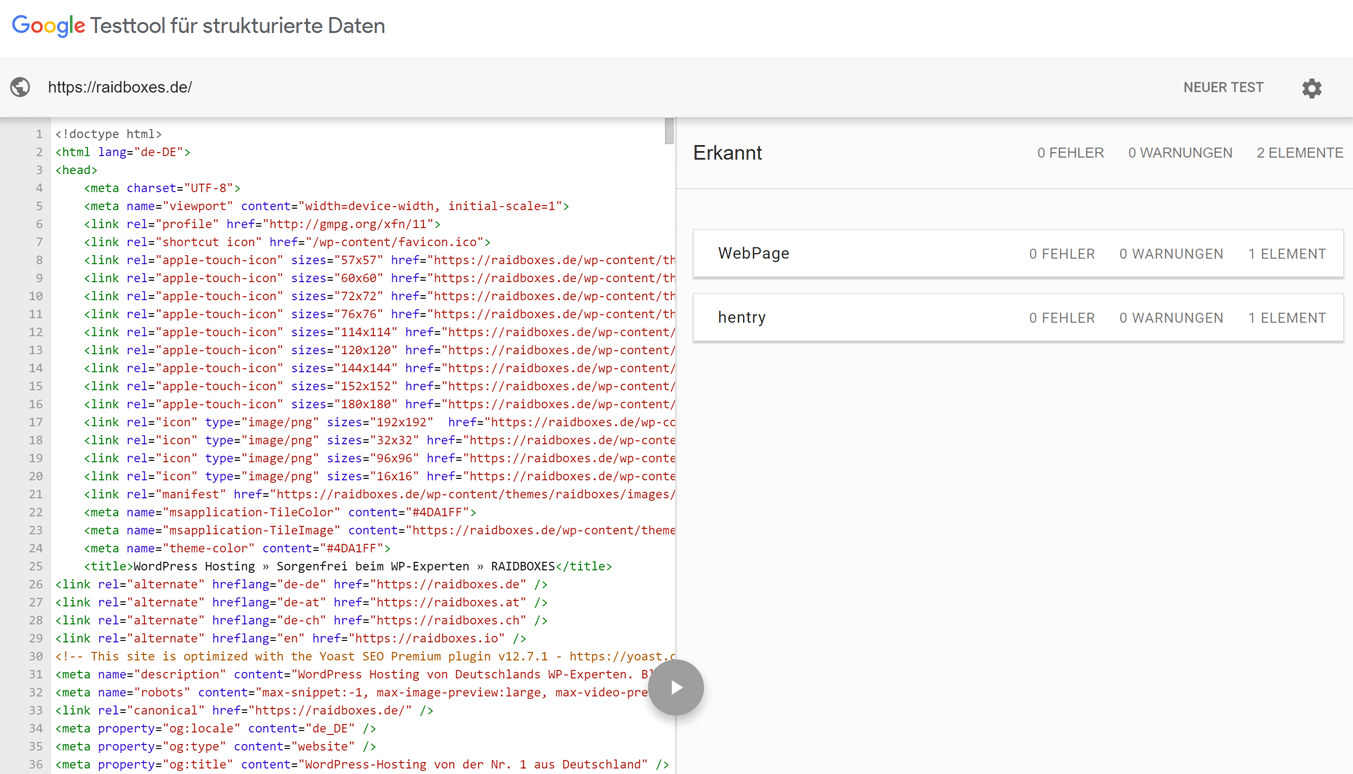
In short: Do not neglect the technical structure of your website. Content may be king. But if every operator only creates high quality content, then it becomes more and more difficult for search engines to choose the best content between all the variations. The influence of other ranking factors (loading time, internal links, relevance, backlinks) thus again plays a decisive role in contested niches.
Search engines have an interest in crawling only the relevant information of a web page. Make clear which urls serve which purpose and how they may be indexed.
Tip: How you subject your website to a technical audit, I'll show you in my detailed tutorial on SEO audit. Including numerous recommendations for improving your sites .
Speed optimization and WordPress hosting
When we look back at the product updates of the last two years, it's striking: The majority of the changes are for performance optimization. The fact that so much effort was put into speed after the announcement of the "Mobile First Index" is no coincidence. Mobile devices have already left desktop search behind. This trend will continue to grow in the coming years. With Google Lighthouse you can check the mobile speed of your websites:
Webmasters should consider the fast delivery of their websites and choose an appropriate WordPress hosting. With this and the right measures, the loading times of your projects can be improved enormously.
Better understanding of content and content
In 2019, search engines have also made efforts to better understand content and relationships. Most core updates in 2019 were aimed at text comprehension. Or to the improvement of user experience.
The view of how Google looks at nofollow links will change from March 2020. While it has been common practice in the affiliate industry to declare all outbound advertising links as "nofollow", Google is interested in understanding the context behind ad-supported links for the first time. Or which content of a site was created by users. For this, Google is launching two new link attributes.
In addition, updates such as "BERT" aim to further improve text comprehension. Unfortunately, there is hardly any possibility of technical optimization here for website operators. We can only optimize our content naturally. In other words, write texts that are of high quality and primarily offer meaning and added value for the user. As is the case with tutorials like this one. On the blog of Moz there is a very good explanatory article about BERT, including video.
Tip: You want to find out which content is interesting for your visitors? Then I recommend a keyword research. I explain it to you step by step.
Structured Data is gaining in importance
Structured Data or Schema Markup was already a big topic in the last years. Also in 2019, new possibilities were offered to make the own website more attractive in the search results. Partly, you are even rewarded with better rankings.
Stuctured data will also gain in importance in 2020. Every website operator should find out whether there is a data format for their industry that they can use to their advantage. Local businesses, for example, can start with the LocalBusiness Markup.
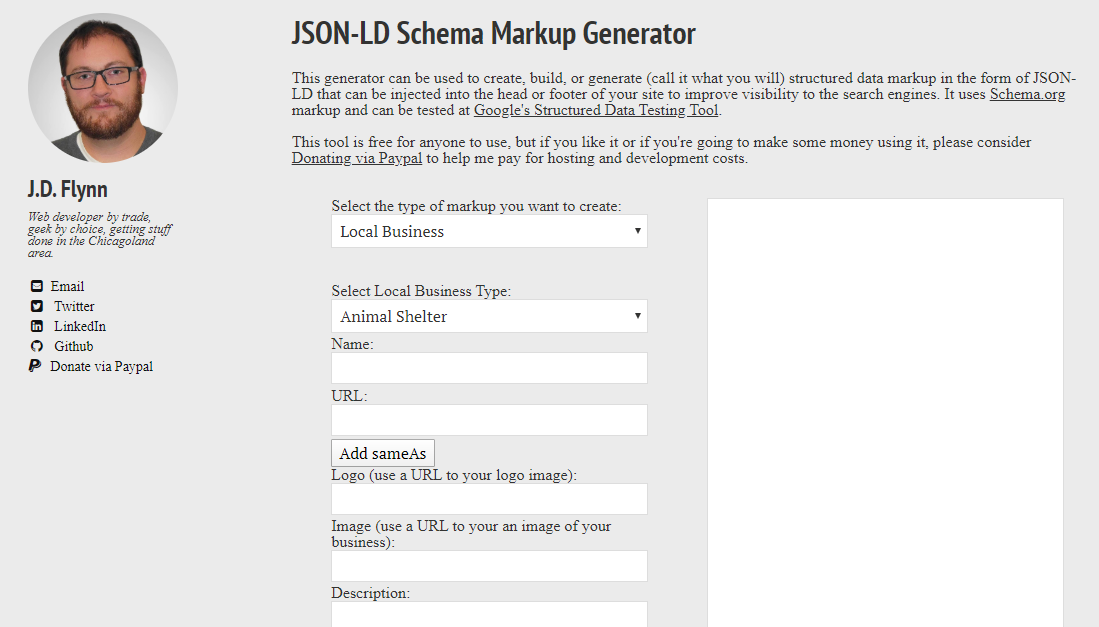
A decision tree by Rand Fishkin helps you decide if Structured Data gives you an advantage. You can read it in the Optimizing for and against Google post on searchengineland.com.
Position 0 through FAQ & HowTo boxes
A complicated issue are the new FAQ-Boxes, which already answer search queries in the search results. And which thus increasingly end in so-called zero (0) clicks results. By the way, these now account for almost half of all search actions.
On the other hand, with the new feature you have the chance to be mentioned in very attractive positions. Here is an example:

The reason this new feature is problematic is because it makes Google a direct competitor in search results for the first time. I love FAQ boxes, but as a website owner you have to seriously ask yourself:
- What information are you giving to the search engine?
- Do you want to give up that opportunity to your competitors?
- How important is the click for this search query for your website? Or how high is the chance that the FAQ box ends in a click?
- Is it possible to write content in such a way that there is no chance but clicking?
Rand Fishkin had this to say at SMX East:
The prisoner's dilemma is: Do I optimise for zero-click searches, for providing these answers, for marking my results the way Google wants them - and potentially losing traffic as a result?
He presents the following decision tree as a possible solution:
Comeback of meta optimization
And this leads us to an optimization opportunity that is often neglected: Meta titles and meta descriptions! And yes, meta descriptions are no longer active ranking factors. But the click rate (CTR) in the serp's has a passive positive effect on the search engine optimization of yourssite .
The difference with 2019: With the ever-increasing trend of 0-click interactions and the breadth of information in FAQ Boxes, you need to stand out more and more to get a click in search results.
Do not rely on the automatic generation of meta information. Use a WordPress SEO plugin to make sure that your most important URLs have an appealing, attractive meta description. It has to be written in an interesting way, so that it stands out from FAQ's and better positioning if necessary.
Javascript and SEO
JavaScript is a great thing - search engines go a long way to better understand JavaScript content. They educate webmasters through free courses and update their own crawlers. And enormous progress has been made in recent years. But even in 2020, static sites content will have an advantage over sites dynamic content in search engine optimization. I am sure of that.
These were my thoughts about the upcoming SEO trends in 2020. What is your best guess? Do you have questions about the SEO strategy in 2020? Which methods worked particularly well for you in 2019? I am looking forward to a lively exchange in the comments!
Want more tips on WordPress and SEO? Then follow us on Twitter, Facebook or via our newsletter.
Contributing photo: Vince Fleming
